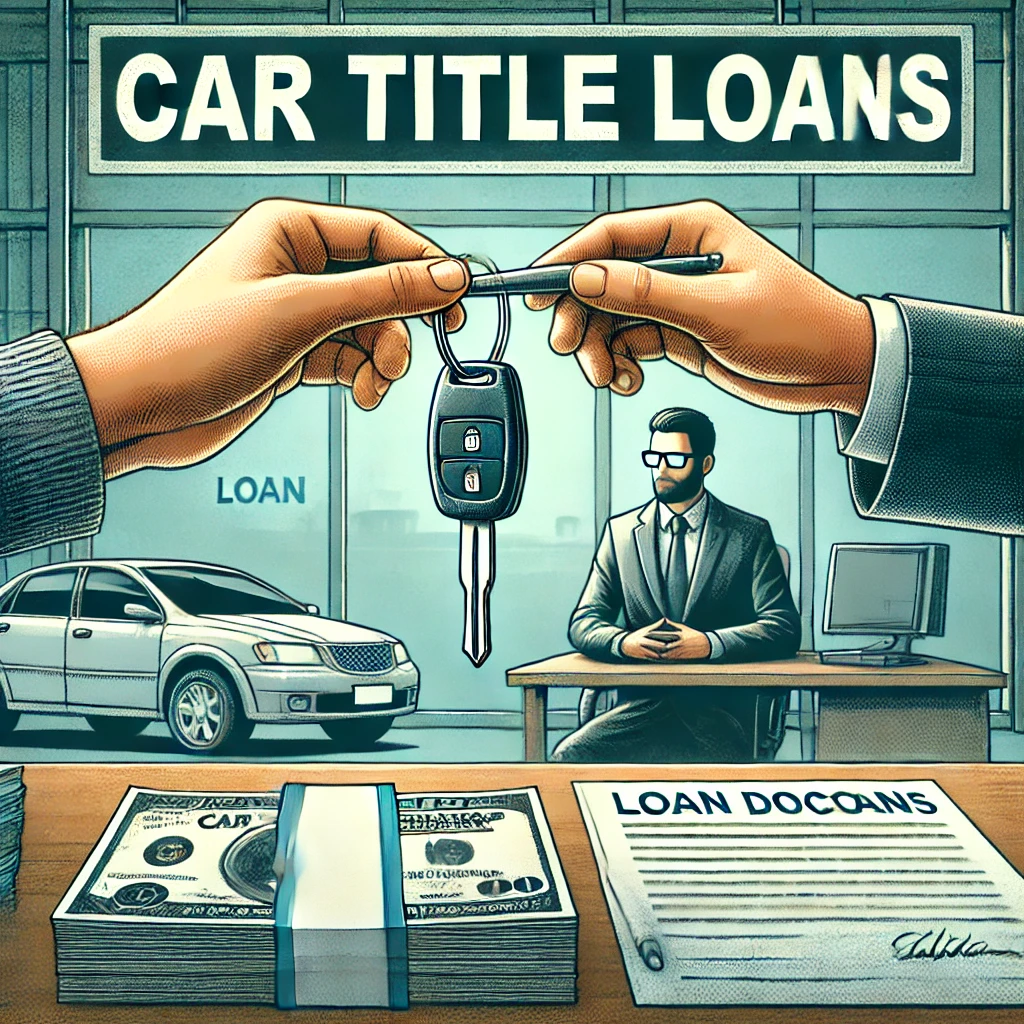
When you apply for a car title loan, the lender evaluates your vehicle’s worth and offers you a loan based on a percentage of its value. The key to remember here is that while you continue to use your car, the lender holds onto the title and may also require a copy of your keys or install a GPS tracker to mitigate their risk.
These loans are typically short-term—often due within a year or even a few months. The interest rates can be significantly higher than standard bank loans, which is a critical factor to consider.
Comparing Car Title Loans to Other Loan Types
There are many types of loans you can get in Canada. Car title loans differ from the rest in the sense that you are putting your vehicle as collateral.
| Loan types | Features |
|
Car title loans |
Collateral Required: Yes (your car) Interest Rates: High (often 20% to 60% APR) Loan Term: Short (1 month to a few years) Loan Amount: Based on vehicle value Credit Score Impact: Minimal impact (high risk) Repayment Risk: High (loss of vehicle) Approval Speed: Fast Typical Use: Emergency cash, short-term needs |
|
Personal loans |
Collateral Required: No (usually unsecured) Interest Rates: Moderate to High (varies widely) Loan Term: Varies (1 to 5 years) Loan Amount: Based on creditworthiness Credit Score Impact: Significant (based on credit check) Repayment Risk: Medium (credit score impact) Approval Speed: Moderate to fast Typical Use: Debt consolidation, large purchases |
|
Payday loans |
Collateral Required: No Interest Rates: Extremely high (up to 400%+ APR) Loan Term: Very short (2 weeks to 1 month) Loan Amount: Small amounts ($100 to $1,500) Credit Score Impact: Minimal (short term, high risk) Repayment Risk: High (cycle of debt risk) Approval Speed: Fast Typical Use: Emergency cash, immediate expenses |
|
Home equity loans |
Collateral Required: Yes (your home) Interest Rates: Lower (closer to mortgage rates) Loan Term: Long (up to 30 years) Loan Amount: Based on home equity Credit Score Impact: Significant (requires good credit) Repayment Risk: Medium (loss of home) Approval Speed: Slow (involves appraisal) Typical Use: Large expenses, renovations, debt consolidation |
Comparison Table Explanation:
- Car Title Loans: These loans are secured against your car, offering quick cash but at sometimes quite high interest rates and the risk of losing your vehicle if you default. They are typically used for urgent cash needs.
- Personal Loans: Generally unsecured and based on your credit score, personal loans offer moderate-to-high interest rates and are used for a variety of purposes, including debt consolidation and major urgent purchases.
- Payday Loans: These provide small, short-term cash advances at extremely high interest rates, intended to cover expenses until the next payday. They are notorious for leading to cycles of debt due to their steep fees and short repayment terms.
- Home Equity Loans: Secured against your home’s equity, these loans offer larger amounts at lower interest rates, suitable for significant expenses like home renovations or consolidating high-interest debt.
- Line of Credit / Cash Advance: these can allow you to access some quick cash while paying 0% in interest. Companies like Bree or Nyble are examples of two Canadian companies that can offer you up to $350 cash advance at 0%.
Where to Find Car Title Loans in Major Provinces
Here’s a quick rundown of where you might find car title loans across some major Canadian provinces:
- Ontario: In Ontario, companies like LoanMart and Fast Action Finance offer car title loans. These are two of the more well-known providers in the region, and they usually have a pretty straightforward application processes. These companies have offices in Toronto, Mississauga, Brampton, Hamilton, Niagara Falls, London, Windsor, Barrie, Ottawa and many other Ontario cities and towns.
- British Columbia: If you’re in BC, you might check out companies like Snap Car Cash and Get Loan Approved. Both have a presence in several major cities across the province, including Vancouver, Victoria, Surrey, Kamloops, Kelowna, and more. They offer loans based on the value of your vehicle.
- Alberta: Albertans can turn to lenders such as Edmonton Auto Loans or Equity Loans Online. These companies cater specifically to the local market and understand the economic dynamics of the province. They have offices in Calgary, Edmonton, Medicine Hat, Red Deer, Lethbridge and many other Alberta cities.
- Quebec: Quebec has different regulations, but you can find similar services from lenders like Cash Depot and Prêt Instant. They offer various quick loan services, including options secured against vehicles. You’ll be able to find physical locations in Montreal, Laval, Quebec City, Longueuil and many other regions across La Belle Province.
Consult with CompareHub by Loans Canada for other alternative loan options.

How to Apply For a Car Title Loan
To apply, you’ll need your vehicle, the clear title to the car, proof of insurance, and personal identification. Most lenders also require proof that you have a steady income. The application process usually involves an inspection of your car, either in person or via submitted photographs, and can often be completed online or over the phone.
WARNING: Before You Apply
Before you decide on a car title loan, understand that you risk losing your car if you don’t pay it back. You should consider alternatives that might be safer or cheaper, like a personal loan at your local bank or credit union, a cash advance from a service like Nyble or Bree, a line of credit, or even borrowing money from family or friends. You can search for alternative options through CompareHub.
If you do decide a car title loan is the right choice for you, make sure you have a solid plan for repayment. It’s crucial not to underestimate the impact of high interest rates on your ability to repay the loan promptly.
If you go ahead with a car title loan, remember to read the terms carefully. Understand all the fees involved and what happens if you can’t make a payment on time. Being fully informed can help you avoid unpleasant surprises and make a plan that keeps your financial health intact.
☝IMPORTANT 2025 TIPS:
➔ Need help with your existing debt? Check with Consolidated Credit Canada to see if you qualify for debt relief.
➔ Cannot obtain a bank loan for your vehicle? Check with CompareHub for access to an alternative loan. (Anticipate higher interest rates though!)
FAQ
1. How do I qualify for a car title loan in Canada?
To qualify, you must own a vehicle with a clear title (no liens against it), have a valid driver’s license, and sometimes provide proof of insurance. Your vehicle will need to be appraised by the lender.
2. Are car title loans legal in all provinces?
The legality of car title loans varies by province. Some provinces have specific regulations or bans against high-interest loans. Check your local laws to see if car title loans are permitted in your area. Read this article from the Government of Canada to learn more about car title loan regulations.
3. What are the interest rates for car title loans?
Interest rates can be very high, often exceeding 30% annually, plus additional fees. Rates and fees can vary widely depending on the lender and your province.
4. How much money can I borrow with a car title loan?
The amount you can borrow generally depends on the value of your vehicle. Lenders may offer a portion of your car’s appraised value, often between 25% and 50%.
5. What are the risks of taking out a car title loan?
The primary risk is the potential loss of your vehicle if you cannot repay the loan. Also, the high interest rates and fees can lead to a cycle of debt that’s difficult to escape.
6. Can I get a car title loan with bad credit?
Yes, car title loans are often available to individuals with bad credit because the loan is secured by your vehicle, which means your credit score and financial history don’t matter as much. Though you can obtain a car title loan, improving your credit score and seeking debt relief options through organizations like Consolidated Credit Canada is still helpful.

7. How quickly do I have to repay a car title loan?
Repayment terms can vary, but typically, car title loans are designed as short-term financial solutions and may require repayment within 15 to 30 days or extend up to a year.
8. Can I pay off my car title loan early?
Most lenders allow early repayment, and some may waive the interest if paid back early. However, confirm this with your lender as some might charge early payment penalties.
9. What happens if I can’t repay my car title loan on time? – If you can’t repay the loan on time, the lender may offer to “roll over” the loan into a new loan, but this will incur more fees and interest. If you continuously fail to repay, the lender has the right to seize your vehicle.
10. How do I find a reputable car title loan lender? – Research lenders thoroughly, read online reviews, and check their status with the Better Business Bureau. Always read the loan agreement carefully and understand all the terms and conditions before signing.
11. Are there alternatives to car title loans? – Consider alternatives like cash advances, personal loans, lines of credit, credit card cash advances, borrowing from friends or family, or talking to a financial advisor about other options that might be available based on your financial situation. To enhance your financial position look into additional options for debt relief such as those offered by Consolidated Credit Canada.


